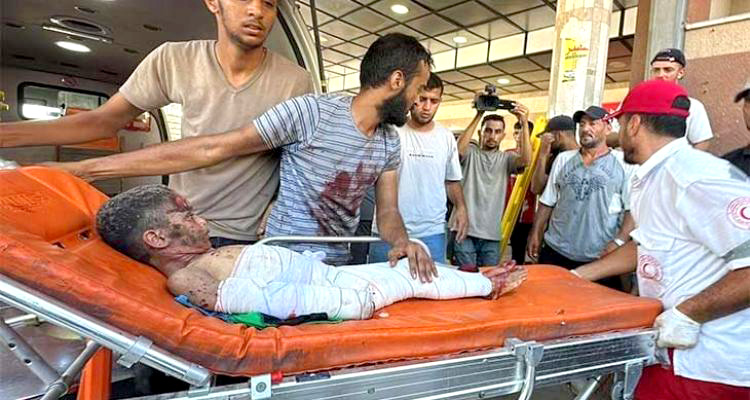
FOREIGN doctors volunteering in Gaza’s overwhelmed hospitals have shared distressing accounts of the dire medical situation and war crimes they’ve witnessed.
With 80% of the healthcare system non-operational, medical professionals struggle to treat tens of thousands of injured civilians amidst severe shortages and continuous bombardment.
Dr Ahmad Youssef, an American specialist in internal medicine and paediatrics, spent three weeks at Al-Aqsa Martyrs Hospital.
The hospital, operating at triple capacity, treats children on cardboard in hallways due to bed shortages.
Youssef recounts a particularly tragic case: ‘I witnessed everything I studied and learned about the burns that patients suffer from happening right before my eyes in a single day. Every time I think that the situation can’t get worse, it does.’
Dr Tami Abu Ghanim, an American emergency physician, observed, ‘60 to 70% of the injured coming from homes targeted by Israeli bombs were children.’
She added, ‘The things we saw in Gaza are unimaginable. Children are not getting basic nutrition. Every child needs psychological care that they won’t be able to receive for a very long time.’
Paediatric intensive care doctor Tania Al-Haj Hassan shared her experiences at a Democratic Party conference: ‘We have been trained to protect and preserve human life, but the Israeli military campaign targets life and everything necessary for its continuation in Gaza, making our work as doctors impossible.’
American surgeon Feroz Sidhu witnessed what he described as ‘unconventional’ weapons being used.
He recounted, ‘There was an injured child from the shrapnel bombs, and I had to perform a difficult surgery on him. During the operation, the mother held her child, which encouraged him to endure the procedure. She refused to compromise her dignity and love for her children despite her own severe injuries.’
Professor Ahmed Abdel Aziz, an orthopaedic surgeon from Cairo University, stated in April, ‘The remaining ones are doing a remarkable job with utmost precision, but they are extremely exhausted and working with the available resources that are diminishing over time, as most injuries are accompanied by broken bones, exposed muscles, and severed arteries and tendons.’
Dr Sam Al-Attar, who volunteered in Gaza last April, shared, ‘I still think about all the injured people and all the doctors who stayed there, and there’s an internal sense of guilt that I left despite their great need to be there, and yet I had to leave.’
American physician Mark Perlmutter emphasised, ‘I have seen children with missing parts of their bodies, and others crushed by buildings, some of whom were taken out by large bomb fragments.’
The Gaza Strip’s Ministry of Health reports that over 500 medical personnel have been killed, with most hospitals now out of service.
• See editorial